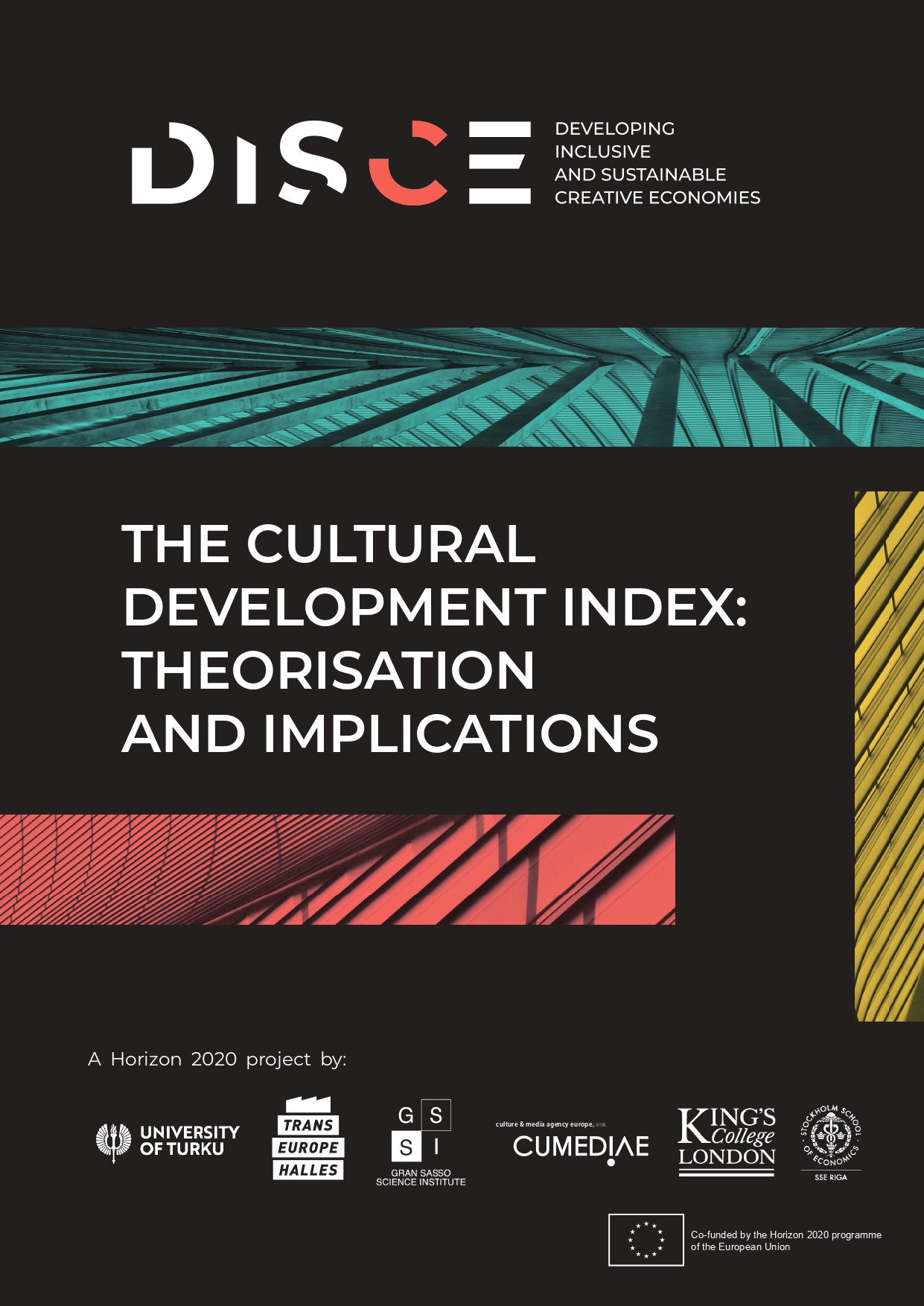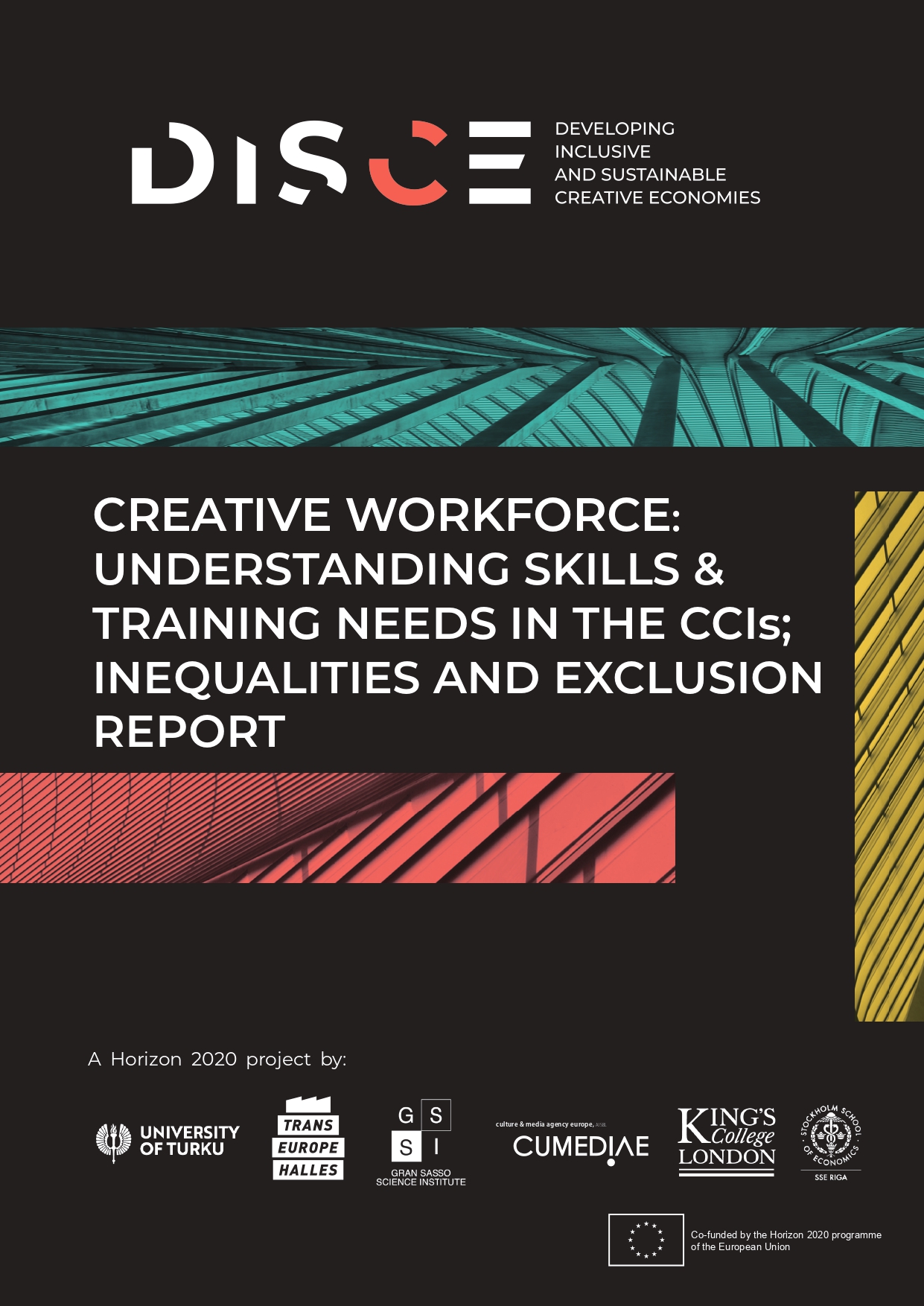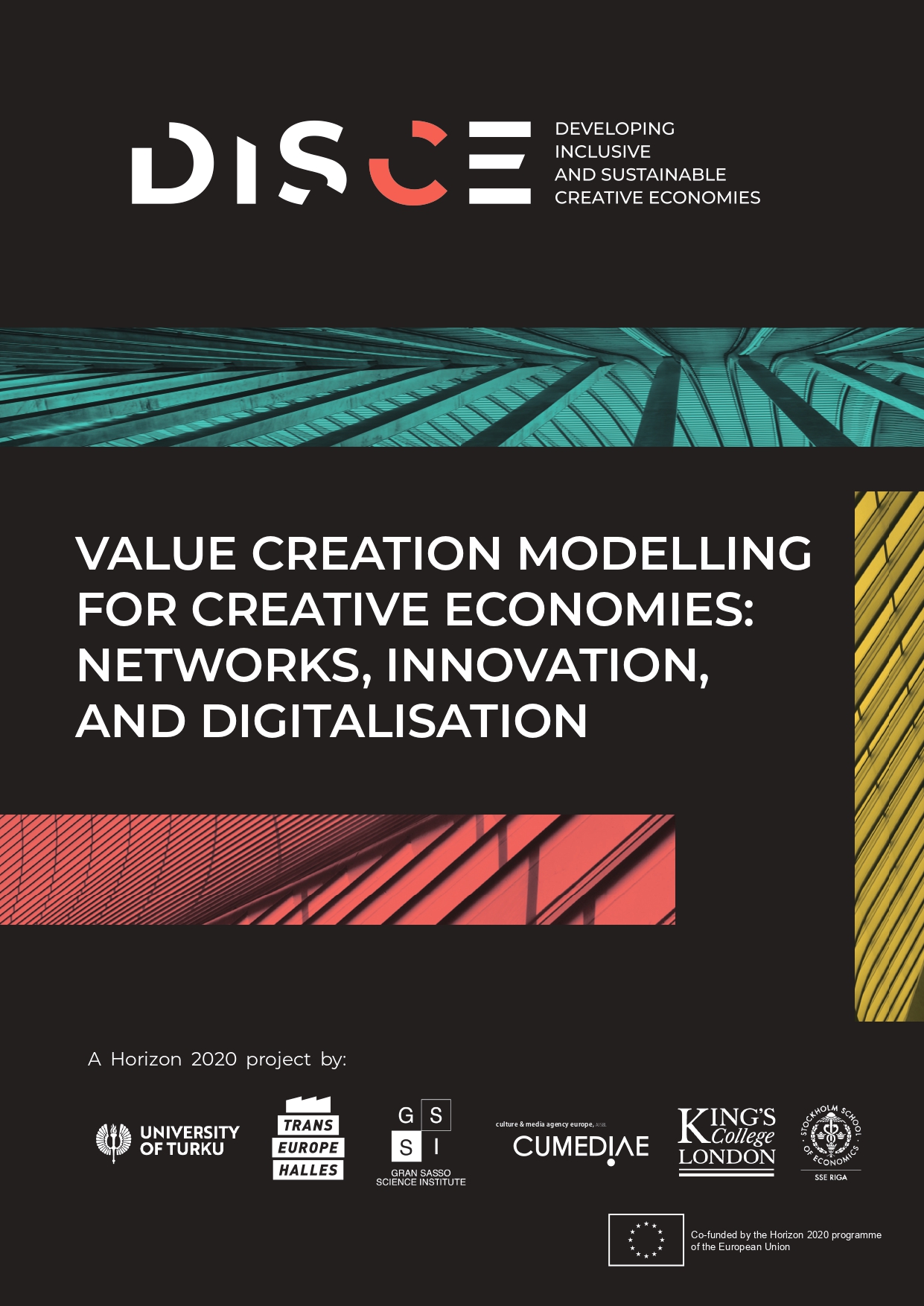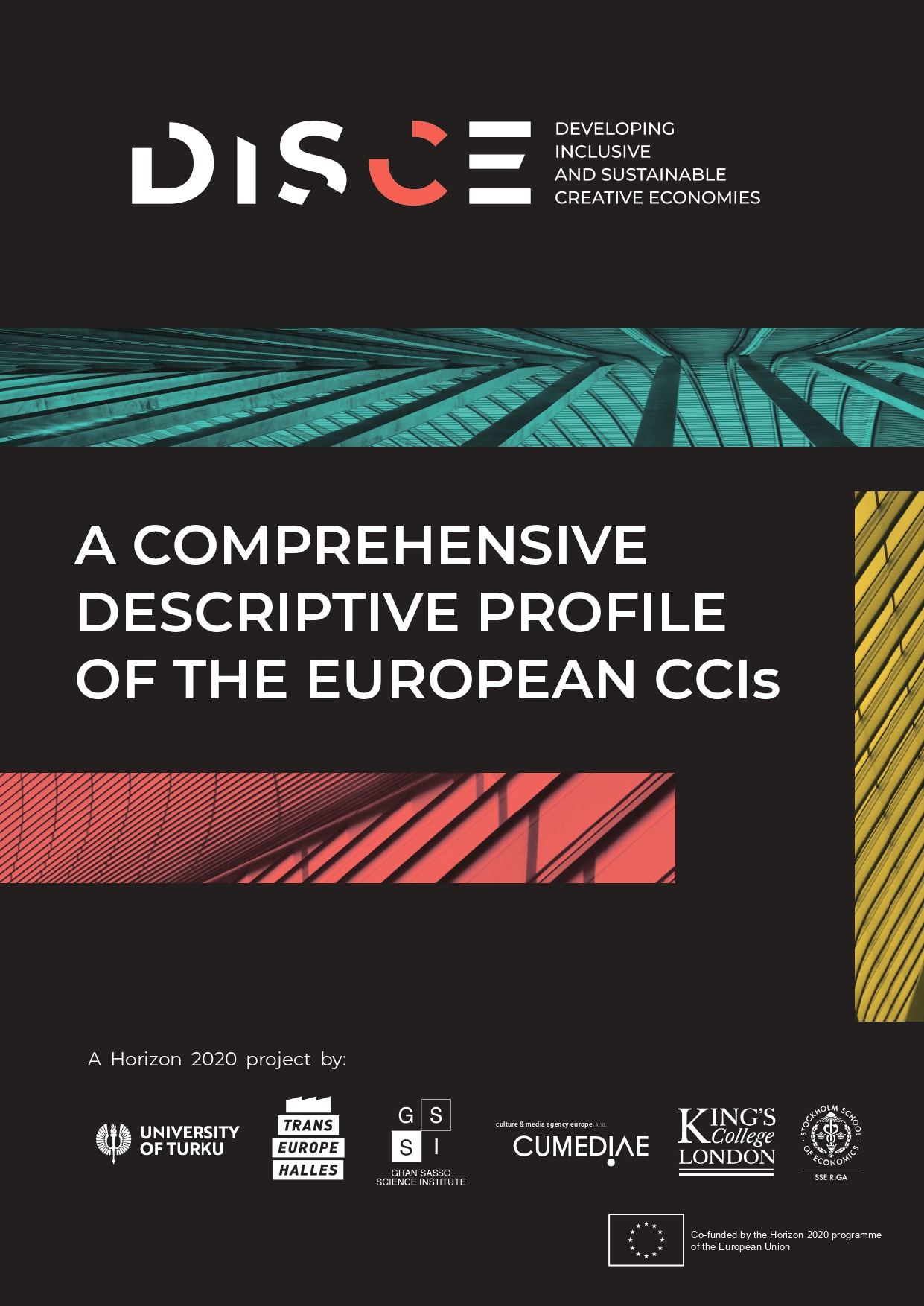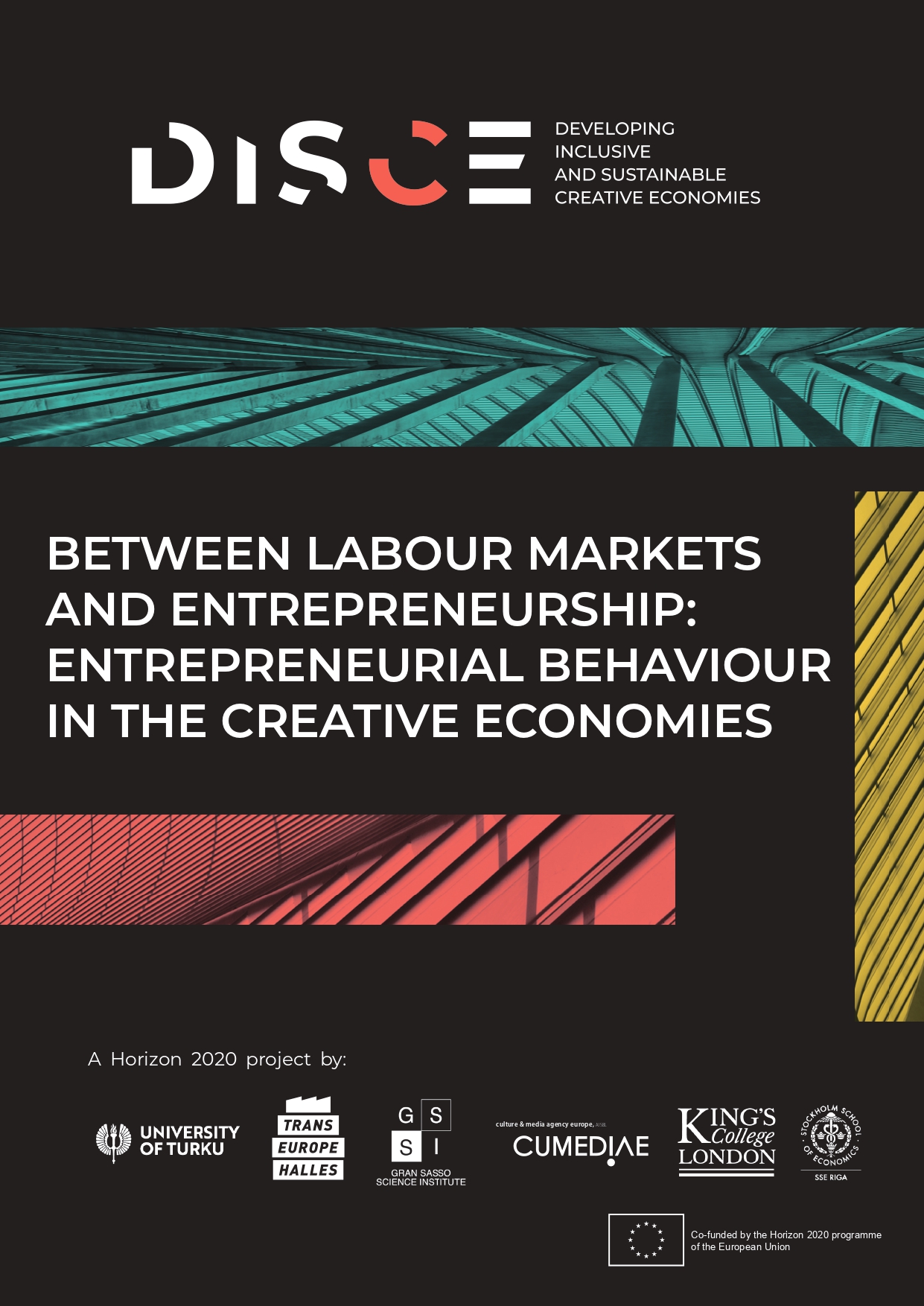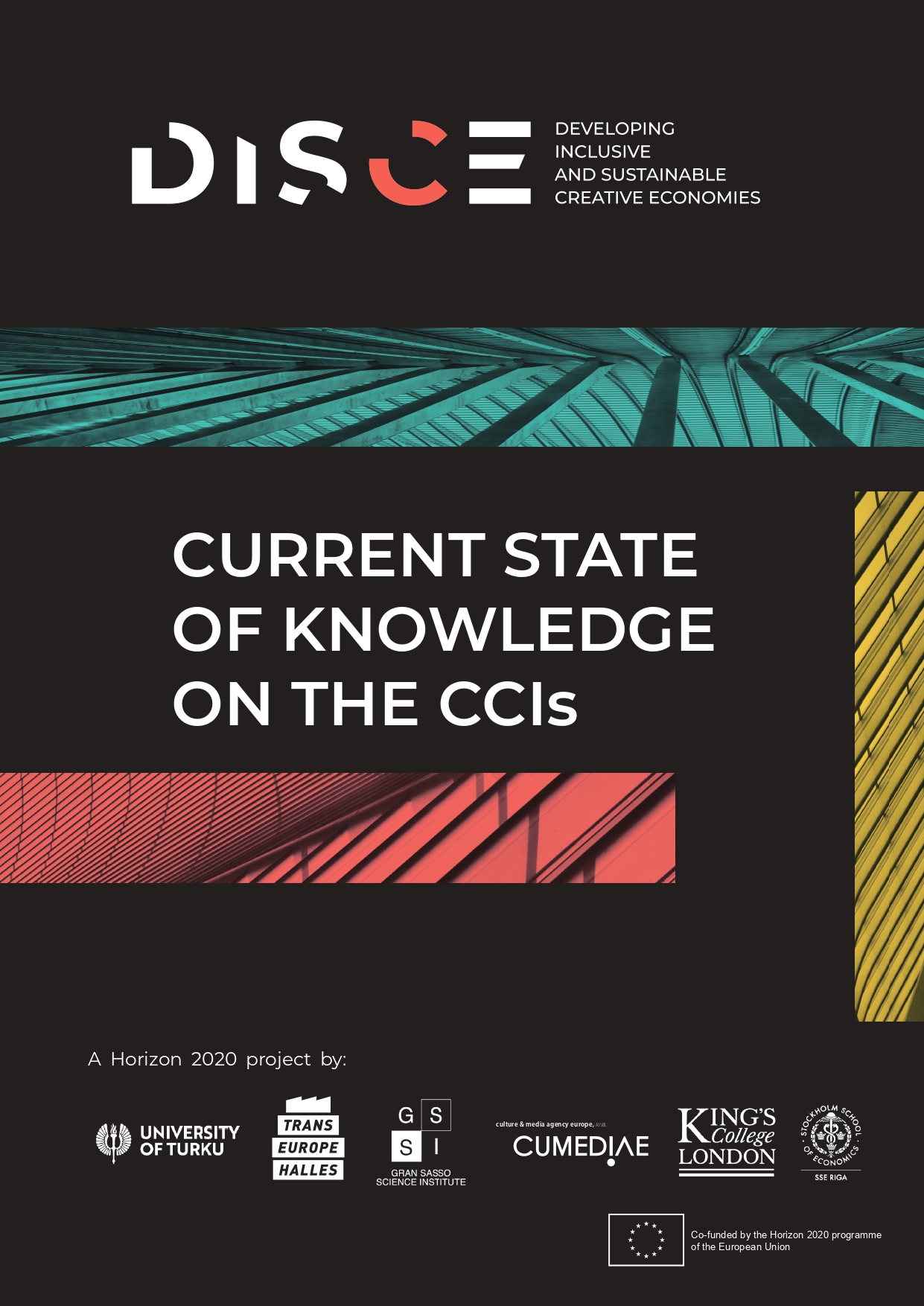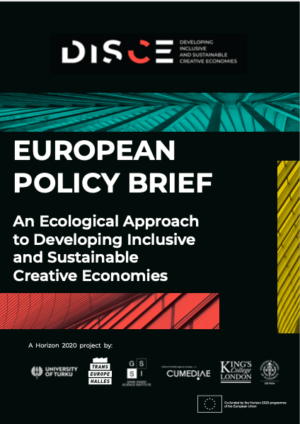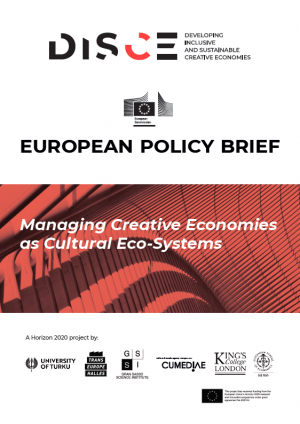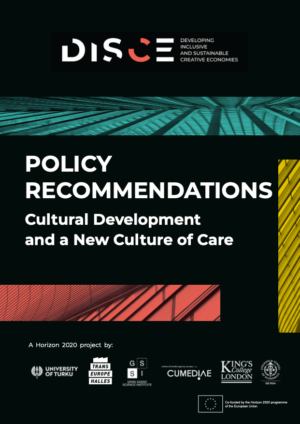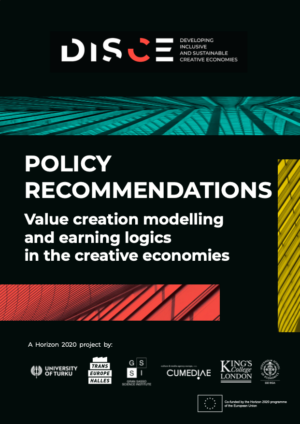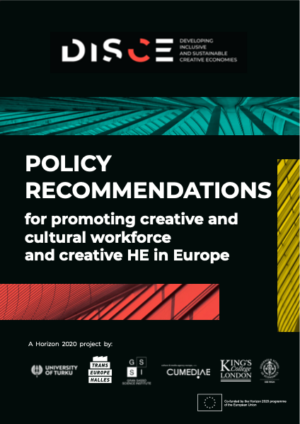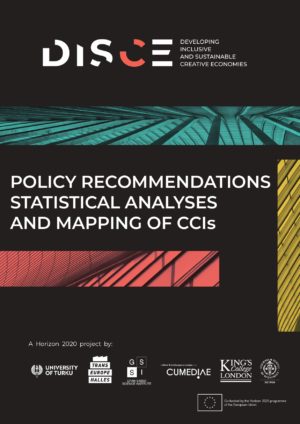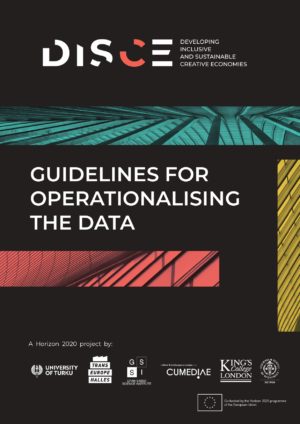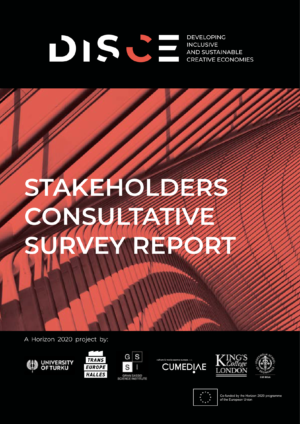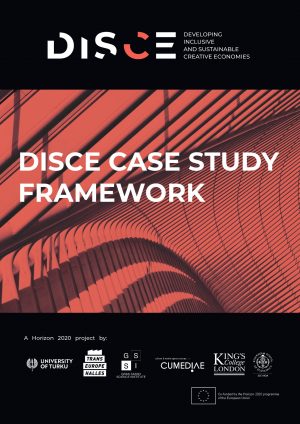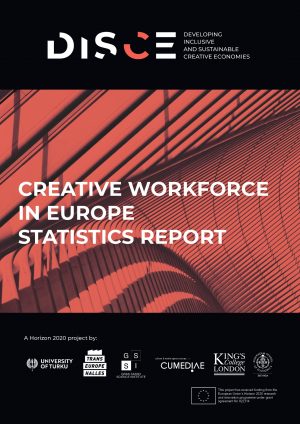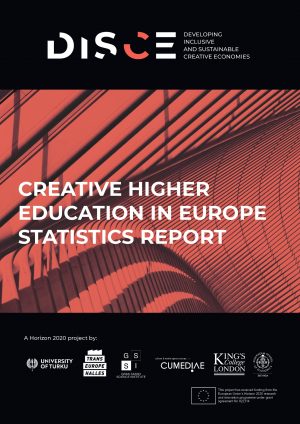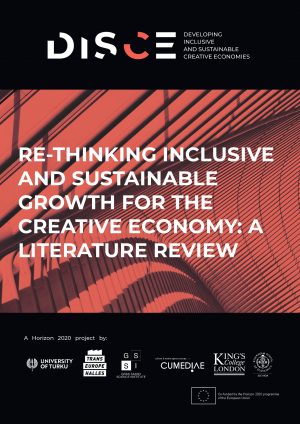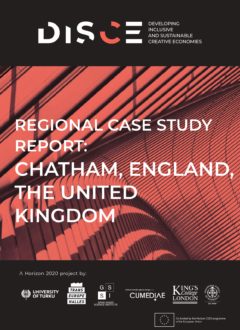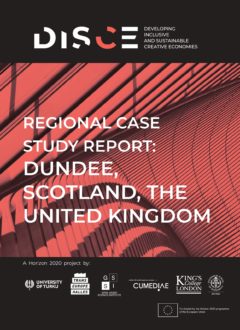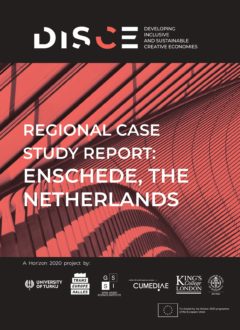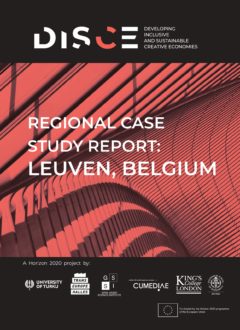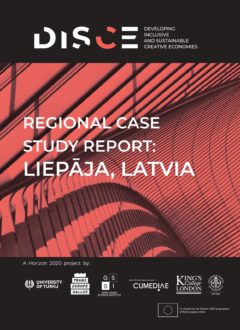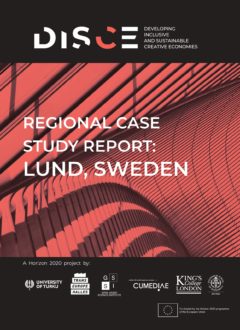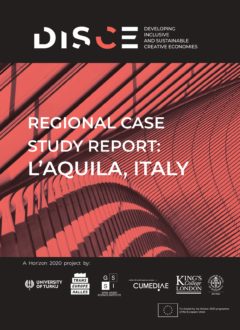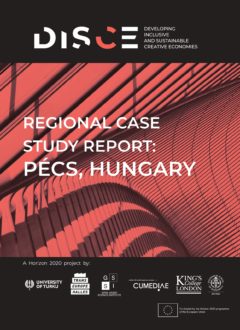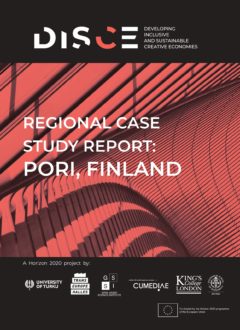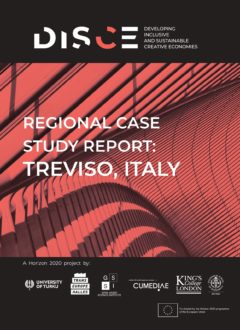Do you want to know more about DISCE and what is around it? This section gathers together publications and documents to go deeper in our world and work!
FINAL REPORTS
THE CULTURAL DEVELOPMENT INDEX: THEORISATION AND IMPLICATIONS
This report addresses these issues by introducing the Cultural Development Index (CDI) – in which cultural development is understood as the expansion of cultural capability – and presenting the work that underpins it. In so doing, we invite policy makers and their publics to give greater attention to the conditions that enable people to explore what matters to them.
CREATIVE WORKFORCE: UNDERSTANDING SKILLS & TRAINING NEEDS IN THE CCIs; INEQUALITIES AND EXCLUSION REPORT
This document presents the analysis centred on creative and cultural work (CCW) across the 10 DISCE case studies, offering an in-depth analysis of CCW alongside creative and cultural skills development and creative education from an ecological perspective.
VALUE CREATION MODELLING FOR CREATIVE ECONOMIES: NETWORKS, INNOVATION, AND DIGITALISATION
What are the value creation models in the creative economies? How can inclusive and sustainable value creation (i.e. artistic, societal and monetary value) modelling in the creative economies be supported? What is the role of networks and networking in the creative economies? How can inclusive and sustainable networking be supported? What is the role of innovations in creative economies?
A COMPREHENSIVE DESCRIPTIVE PROFILE OF EUROPEAN CCIs
How can the creative economies of the future be both inclusive and
sustainable? This report provides a quantitative mapping of CCIs according to the DISCE perspective.
BETWEEN LABOUR MARKETS AND ENTREPRENEURSHIP: ENTREPRENEURIAL BEHAVIOUR IN THE CREATIVE ECONOMIES
Investigating the figures of creative freelancers and entrepreneurs, and their work experiences.
CURRENT STATE OF KNOWLEDGE ON CCIs
DISCE's approach is to combine both conceptual and empirical inquiry. As part of the overall research design, WP2 has a specific role in helping to analyse the range of data that is used in processes of modelling and analysing the ‘creative economy’ in Europe. However, part of the approach of DISCE is to rethink what we might mean by ‘inclusivity’ and ‘sustainability’ and to ask: what are ‘creative economies’. Working with the other DISCE work packages, WP2 will work to develop new approaches to mapping and measuring creative economies across the EU.
POLICY BRIEFS
AN ECOLOGICAL APPROACH TO DEVELOPING INCLUSIVE AND SUSTAINABLE CREATIVE ECONOMIES
Developing Inclusive and Sustainable Creative Economies (DISCE) is a multi-disciplinary research project which has tackled the inherent tensions associated with creative economies by questioning their taken-for-granted assumptions. DISCE conducted research during the pandemic, which has highlighted the structural inequalities, unfulfilled potentials and limited inclusivity and sustainability of creative economies as well as the limited scope of the existing creative economy policy challenges that already existed before Covid-19 (Comunian & England, 2020). This policy brief outlines specific policy considerations and suggestions based on the DISCE research project.
MANAGING CREATIVE ECONOMIES AS CULTURAL ECO-SYSTEMS
The COVID-19 pandemic is raising fundamental questions about how economies and societies are organised in addition to the limits and possibilities of government action. For ‘creative economies’, these questions are urgent. A crisis such as COVID-19 not only creates new conditions; it also reveals what was already the case, spotlighting structural inequalities and injustices as well as unfulfilled potentials – the precariousness of creative work, the limited inclusivity and sustainability of creative economies, the uncertain effects of digital transformations and the limited scope of existing creative economy policy. As with many aspects of our socio-economic systems, the pandemic has made them more visible.i Alternatively, the shock provided by COVID-19 may also make it possible to identify and take advantage of new opportunities to move towards a more sustainable future in creative economies. Crises have often been powerful push factors for accelerated socio-economic development because they can force individuals, organisations and communities to find alternative solutions when existing ones become rapidly obsolete.
Policy Recommendations
POLICY RECOMMENDATIONS: CULTURAL DEVELOPMENT AND A NEW CULTURE OF CARE
There has never been a more important time to recognise the value of culture. The question is, what culture (or cultures) do we need? DISCE’s answer to this question is distinctive in its approach and ambitious in its vision. What is needed is a ‘new culture of care’, characterised by committing to cultural development, adopting the Cultural Development Index (CDI) and championing (cultural) needs-based governance.
In this report the authors set out what this vision for a new culture of care involves; how it enables – and is enabled by – inclusive and sustainable creative economies; and present recommendations to policy makers for how to bring such a cultural change about.
POLICY RECOMMENDATIONS: VALUE CREATION MODELLING AND EARNING LOGICS IN THE CREATIVE ECONOMIES
This report provides policy recommendations to support inclusive and sustainable activities (paid and unpaid work and self-employment) and value creation (i.e. artistic, societal and monetary value) modelling in creative economies. It discusses various ways to support inclusive and sustainable networking and innovation as well as the roles and means for the policy stakeholders in fostering inclusive value creation, networks, innovations and activities in the creative economies.
POLICY RECOMMENDATIONS FOR PROMOTING CREATIVE AND CULTURAL WORKFORCE AND CREATIVE HE IN EUROPE
This document presents key policy recommendations for promoting creative and cultural work (CCW) and creative higher education in Europe. More specifically, it focuses on some key structures that shape the development of sustainable CCW: Higher/Further education; Work/employment frameworks; Fostering/care infrastructure for CCW. The authors look at current practices among the DISCE case studies and examples of best practice that could be shared across them. For each of these areas, a summary policy recommendations is presented to help local policymakers address some of the challenges they face in a more inclusive and sustainable way.
POLICY RECOMMENDATIONS
STATISTICAL ANALYSES
AND MAPPING OF CCIs
Definition, classification, operationalisation, and policy recommendations as a result of a critical review of CHIs in Europe.
Reports
GUIDELINES FOR OPERATIONALISING THE DATA
Among the goals of the Developing Inclusive & Sustainable Creative Economies (DISCE) project, is the need to collect quantitative data and improve the state of the art of the creative economy and creative and cultural industries (CCIs) from a statistical viewpoint. As highlighted in the “Measuring creative economies: existing models & the DISCE approach” (see the previous report), there is no clear consensus about the definition of creative economy itself. However, this report aims to investigate the most important variables and indices to define CCIs.
In the first part of the project, WP2 is devoted in gathering data at different levels of analysis: country, regional (NUTS2), province (NUTS3) and city. This strategy allows both academics and policy makers to have a consistent overview of all the available data related to several aspects of CCIs, such as: cultural venues and facilities, cultural participation and attractiveness, creative and knowledge-based jobs, and so forth. Moreover, this phase covers not only different characteristics of CCIs, but also information about their components (i.e. supply, culture consumption, tourism, education) and socio-economic and institutional variables. These latter have been included to provide a detailed description of the CCIs contexts (UNESCO, 2019).
In the second part, following the Handbook on constructing composite index manual (OECD, 2008), several composite indexes on creative and cultural industries (CCC Index) will be developed through an in depth analysis of variables identified during the first phase. The representativeness of these indicators will be then tested across the project, and in particular after the analyses of single case studies.
The third part is related to firm-level data. After the identification of the NACE2 codes of CCIs, financial and structural information on firms belonging to these sectors are extracted from the Amadeus – Bureau van Dijk databases. These data include also the geographical localisation of firms, i.e. the latitude and longitude. Therefore, it is possible to represent the geographical distribution of these firms through maps and network-analysis, and better investigate the agglomeration forces which push these companies to settle in the same areas or regions. Adding the geographical aspects will help to draw a complete picture of the CCIs from different perspectives.
STAKEHOLDERS CONSULTATIVE SURVEY REPORT
In the context of WP6 Task 4.1 of the Grant Agreement, Culture and Media Agency Europe aisbl and Trans Europe Halles co-developed the DISCE Stakeholders Consultative Survey, reaching out firstly to the voices of relevant and highly representative organisations active in the cultural and creative sector at a European, national and local level. The Survey was not developed for scientific research purposes but to stimulate stakeholder engagement and discussions, especially from a policy engagement perspective.
The main objectives of the Survey are to :
– Engage stakeholders, and make them aware of the DISCE project and its activities;
– Provide stakeholders with the possibility to comment/have a say on DISCE’s research work.
DISCE CASE STUDY FRAMEWORK
What exactly are case studies? What distinguishes case studies from other approaches to research? What are their specific capacities for generating new knowledge? And how exactly will we be making use of a case study approach as a central part of Developing Inclusive and Sustainable Creative Economies?
CREATIVE WORKFORCE IN EUROPE STATISTICS REPORT
This document’s central objective is to look critically at the current data and knowledge in relation to the creative and cultural workforce (CCW). While there is a wealth of data in this field which cover pan-European, national and regional approaches, the objective of this report is not to simply replicate existing available data but to critically discuss the approaches (and resulting data) that are currently being collected (at various levels from European to regional) and assess the knowledge they provide for the DISCE project. Throughout this report we discuss the various implications that the body of existing research has for DISCE and WP3 in relation to its objectives and planned methodological tools.
Overall, the report addresses some key questions about who gets to ‘be creative’. We explore who is enabled to participate and who is classified as contributing to the creative economy through their labour. The report brings together a wide range of research on the CCW to document the diverse and at times, contradictory knowledge available on those who are working within and contributing towards the creative economies across Europe. This is an ongoing process, and as part of the report’s outputs we propose a survey that aims to bring together and map formal and informal organisations that have an interest in creative and cultural work across Europe to further systematise our current knowledge of the sector and the issues that creative and cultural workers face.
CREATIVE HIGHER EDUCATION IN EUROPE STATISTICS REPORT
The document’s central objective is to look critically at the current data and knowledge in relation to the provision of creative subjects at Higher Education (HE) level1. While there is a wealth of data which cover pan-European, national and regional approaches, the objective of this report is not to simply replicate existing available data but to critically discuss the approaches (and resulting data) that are currently being collected (at various levels from European to regional) and assess the knowledge they provide for the DISCE project. Throughout this report we discuss the various implications that the body of existing research has for DISCE and WP3 in relation to its objectives and planned methodological tools.
The report reflects on the important connections between HE and creative economies across Europe. The importance of this relation has been acknowledged both in academic research and at the European policy level. We acknowledge that creative economies connect with HE at a range of levels and across many subjects. However, in the report we focus specifically on creative subjects taught at HE level. We examine the current state of knowledge on creative students and graduates across Europe, drawing on European and national level data linked to student access, experience and employability beyond graduation. This section also looks at international examples to compare best practice in terms of student monitoring both prior, during and beyond graduation. We consider how these subjects are provided and valued, what skills are reported as being promoted and developed along with a consideration of how student experience creative HE and how students contribute to their local societies and wider economies both through and as a result of their HE in creative subjects.
RE-THINKING INCLUSIVE AND SUSTAINABLE GROWTH FOR THE CREATIVE ECONOMY: A LITERATURE REVIEW
The report’s central objective is to critically address key concepts underpinning prevailing accounts of what economic success – or ‘growth’ – consists of for the creative economy. The literature review analyses three broad discourses and their interconnections: human development, cultural development and care. In the first instance, these ensure that the DISCE project is firmly contextualised within the landscape of existing research. Thereafter, the review seeks to make a distinctive critical intervention with regards to the concepts that matter when it comes to understanding and developing ‘inclusive and sustainable creative economies’.
DISCE is a ‘normative’ project, in two senses: it takes norms (and processes of valuing) as one of its objects of study, and it is not ‘neutral’ with regards to its key terms. Whilst the analytical spotlight of this research project is explicitly directed towards Europe, our intention is for the conceptual work of this literature review to prove useful to creative economies in many locations. Over the next phases of DISCE research we will be reflecting on, and applying the ideas discussed here to European case-studies. This will involve, amongst other considerations, exploring what is specific to these contexts, at micro, meso and macro (including ‘European’) scales.
Adopting an ecological perspective and a caring methodology constitutes an ambitious agenda. With a normative commitment to ‘managing culture with care’ we need to develop an approach to indexing, ‘pointing towards’, that is able to measure what really matters; furthermore, we must do so as fully, democratically and usefully as possible. This is the task that we have set ourselves, and this literature review provides the context for the next phase of research as we seek to formulate a Cultural Development Index.
REGIONAL CASE STUDIES
The ten DISCE Regional Case studies present key facts about each location, with a particular attention to how the ‘creative economy’ has previously been understood, based on a review of existing academic literature, publicly available data, and policy documents.
Please click on the images to read them.

